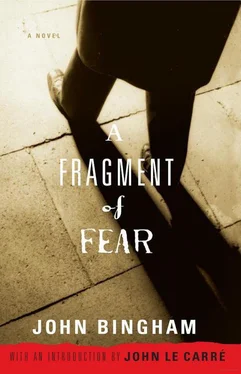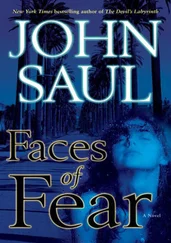John Bingham - A Fragment of Fear
Здесь есть возможность читать онлайн «John Bingham - A Fragment of Fear» весь текст электронной книги совершенно бесплатно (целиком полную версию без сокращений). В некоторых случаях можно слушать аудио, скачать через торрент в формате fb2 и присутствует краткое содержание. Жанр: Триллер, на английском языке. Описание произведения, (предисловие) а так же отзывы посетителей доступны на портале библиотеки ЛибКат.
- Название:A Fragment of Fear
- Автор:
- Жанр:
- Год:неизвестен
- ISBN:нет данных
- Рейтинг книги:3 / 5. Голосов: 1
-
Избранное:Добавить в избранное
- Отзывы:
-
Ваша оценка:
- 60
- 1
- 2
- 3
- 4
- 5
A Fragment of Fear: краткое содержание, описание и аннотация
Предлагаем к чтению аннотацию, описание, краткое содержание или предисловие (зависит от того, что написал сам автор книги «A Fragment of Fear»). Если вы не нашли необходимую информацию о книге — напишите в комментариях, мы постараемся отыскать её.
A Fragment of Fear — читать онлайн бесплатно полную книгу (весь текст) целиком
Ниже представлен текст книги, разбитый по страницам. Система сохранения места последней прочитанной страницы, позволяет с удобством читать онлайн бесплатно книгу «A Fragment of Fear», без необходимости каждый раз заново искать на чём Вы остановились. Поставьте закладку, и сможете в любой момент перейти на страницу, на которой закончили чтение.
Интервал:
Закладка:
My first impression of the superintendent was of a tall, well-built man in his early fifties, with grey eyes, a good head of grey hair, dressed in a grey suit. His face seemed grey, too. It was a strong face, with a good brow and a firm but not cruel mouth. The nose was a little too long, and the chin was pointed rather than square, but it was a pleasant enough, intelligent face. He spoke good English with a strong voice, and had a slight north-country accent.
The sergeant, on the other hand, gave an impression of fawnness. He was shorter and stouter than the superintendent, and had a round, bullet head, a short nose, and a jaw and underlip which protruded aggressively. His hair was spread in bootlace style over a nearly bald skull, and was brown except for the grey bits above his ears. He had brown eyes, and wore a brown suit, and had a putty-coloured complexion. He was of about the same age as the superintendent but, I think, lacked the former’s education and general intellect. He was more of the “old sweat” type of N.C.O. which one used to find in the Army.
They had, however, one dreadful thing in common-fatigue. It was not the superficial fatigue which can be shed by a good nine hours’ sleep. It was something far deeper, something that had been built up over a long period of years. Just as the dirt and grime of certain industrial cities seems to become ingrained in the skins of the workers, so the greyness and the lines of fatigue were implanted on the faces of these two detectives. Their appearance spoke more forcefully than any leading article of a Force below establishment, of cancelled week-ends and shortened holidays, of long nights and days at work, and little appreciation, and no joy.
The superintendent held some typescript in his hand. He said:
“Good evening. You’re Mr. James Compton, of 274 Stratford Road?”
“That’s right. I just called in-”
“Yes, sir, thank you very much,” he said quickly. “There are one or two points I want to clear up.”
“Carry on,” I said.
He gave me the impression of a man in a hurry, which is never very complimentary.
“Last night you were returning home, according to this station report, when you allege you were threatened by two men, at present unidentified. Right?”
“I thought only one man was actually threatening me. The other man-”
But he wouldn’t let me finish.
“Well, anyway, you thought you were being threatened?”
“Correct,” I said shortly.
“You reported the incident. Very properly. You then went to your flat in Stratford Road, where your suspicions were aroused, and you thought some person or persons unknown were in the flat. But a search showed your suspicions were apparently unfounded. Right?”
“Yes-you could put it that way.”
The tired lines round his mouth deepened. He said:
“Look, sir, I don’t want to put it any way except the correct way.”
“Well, that’s right,” I said reluctantly. “But I think my suspicions were right, and I think it’s connected with this woman in the train who complained about me.”
He interrupted me again.
“Tell me about her, sir.”
“There’s not much to tell, and I’ve told Sergeant Matthews already.”
He sat down opposite me. The sergeant shouted through the doorway, “Bert, bring another chair in, will you?” The superintendent waited until the sergeant was seated. Then he said:
“Tell me the story briefly, right from the beginning, sir.”
“Going right back? Back to Mrs. Dawson and Pompeii?”
“Who’s Mrs. Dawson?” he asked.
I guessed that Sergeant Matthews had not bothered to put in a report about anything other than the matter about which he had called.
I had a feeling he wouldn’t do more than briefly mention what I had told him, because of the bored way he had put poor Bunface’s communication in his notebook. But I hadn’t expected him to put in no report at all.
There was nothing for it but to go over the whole thing again. I saw the bald-headed sergeant scribbling shorthand notes. When I had finished there was a silence.
The superintendent was picking at the wooden table with a pin he had found lying on it.
“Can you think of any reason why this unfortunate woman should have made any complaint against you, sir?”
“Certainly not, except that she was in a highly emotional state, and probably neurotic.”
“Can you think of any reason why this woman, whom you had met for the first time, should know your name and address, unless you gave it to her for some purpose, and if you gave it to her, why did you?”
“I dealt with that point with Sergeant Matthews,” I said. The fawn-coloured sergeant spoke for the first time. He had a rasping voice which contrasted with the superintendent’s soft tones. He sounded as though he had spent much of his life shouting at dogs, or horses, or men.
“The superintendent here, he isn’t Sergeant Matthews, sir. He is just asking-”
“I know what the superintendent wants to know, and the answer is, I didn’t give her my name and address and I don’t know how she got it.”
I liked the grey superintendent, but I didn’t like the fawn-coloured sergeant with his jutting jaw and lower lip.
“About this message you think was written on your machine and paper,” began the sergeant.
“I don’t think it was written on my machine. I know it was. So does Sergeant Matthews, and so would you, if he’d written a proper report. And if you’d read it, of course.”
“Why should the message have been typed on your machine, and taken down to the coast, and then brought up again, why shouldn’t it have just been put through your letter box or posted?” asked the superintendent gently.
He had his left elbow on the table, his left hand supporting his head, and was looking thoughtfully. I shook my head helplessly.
“I don’t know,” I said, “I just don’t know. It doesn’t make sense.”
“No, it doesn’t,” said the sergeant.
The superintendent made no comment.
Suddenly the whole thing infuriated me.
“Anyway, why should anyone wish to prevent me probing into Mrs. Dawson’s background? Why should they cook up all this bloody nonsense?”
“There’s a woman been killed,” said the sergeant flatly. “You come along here, and you say, yes, I travelled up with her in the train, the evening before she was killed, and she must have been very neurotic, you say, otherwise she wouldn’t have made up some story about me, you say. Right? And when we ask you a few simple questions, what happens? You bang the table. You get all touchy. Why?”
I didn’t answer. When I spoke I looked at the superintendent, as if he had asked the questions.
“I am not getting touchy.”
“I’m sure you’re not,” he said. “Sergeant, Mr. Compton is not getting touchy, why should he be touchy? He just misunderstood you.”
He looked at me with his calm, tired eyes.
“Mr. Compton, I don’t think you quite understand.”
“No, I don’t,” I said, “I don’t understand. I don’t understand anything. I only know what I know, and that’s what I’ve told Sergeant Matthews, and now you, and I called in here voluntarily to try to help you, and you go on at me. You go on at me so,” I added indignantly.
“We’re not going on at you,” said the sergeant, in his rasping voice. “The superintendent here, he’s just trying to clear up a few points. He’s a busy man, you want to understand that. When a case like this happens, he’s a busy man.”
The superintendent said:
“I am going to ask you again a question I asked you earlier, but on a broader basis. I asked you whether you could think of any reason why this woman should have lodged a complaint against you-I now ask you whether you can think of any reason why you should imagine that this woman lodged a complaint against you?”
Читать дальшеИнтервал:
Закладка:
Похожие книги на «A Fragment of Fear»
Представляем Вашему вниманию похожие книги на «A Fragment of Fear» списком для выбора. Мы отобрали схожую по названию и смыслу литературу в надежде предоставить читателям больше вариантов отыскать новые, интересные, ещё непрочитанные произведения.
Обсуждение, отзывы о книге «A Fragment of Fear» и просто собственные мнения читателей. Оставьте ваши комментарии, напишите, что Вы думаете о произведении, его смысле или главных героях. Укажите что конкретно понравилось, а что нет, и почему Вы так считаете.












